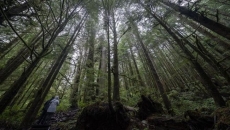The federal government is facing mounting pressure to investigate the importation of endangered monkeys for medical research in Quebec, after a United States probe allegedly prompted a pharmaceutical giant to sharply increase its imports north of the border.
The influx of long-tailed macaques from Cambodia, which the U.S. alleges are being illegally captured from the wild, has animal advocates, researchers and opposition politicians sounding the alarm over animal welfare and potential public-health risks.
The latest push comes from the federal NDP, which is urging Ottawa to bring "immediate attention" to the issue.
Investigators in the U.S. attorney's office in the Southern District of Florida indicted eight people in November 2022, including two senior Cambodian officials, over what they described as "multiple felonies for their role in bringing wild long-tailed macaques into the United States." No charges have been brought against the company or any of its officials and the company has said it will fully co-operate with the U.S. investigation.
Three months later, Charles River Laboratories, a global giant based in Massachusetts, announced it had been subpoenaed in the case — and that it was halting its imports of macaques into the country.
At around the same time, imports of monkeys from Cambodia into Canada dramatically surged.
Canada imported 4,789 live primates from Cambodia in 2023. Statistics Canada data show that's nearly a 500 per cent increase from the year before.
The market value of the importation of this exotic animal jumped from $14.5 million in 2022 to more than $84.4 million the next year, according to StatCan, a roughly 600 per cent surge.
Several researchers monitoring the importation of primates into Canada told The Canadian Press that to their understanding, the only type of monkey being imported from Cambodia is the long-tailed macaque. All of the shipments from Cambodia in 2022 and 2023 were destined for Quebec, where Charles River Laboratories has its only facility in Canada, a sprawling campus in Montreal.
Environment and Climate Change Canada, the federal department responsible for monitoring commercial trade in wildlife, confirmed that 1,980 macaques worth nearly $40 million have come into Canada on three chartered flights so far this year.
Charles River Laboratories did not answer questions about the U.S. investigation, the number of macaques it is bringing into Canada and allegations that monkeys may have been captured from the wild. It previously denied any wrongdoing in the U.S. In an early 2023 earnings report, the firm said "concerns raised with respect to the company's conduct are without merit."
In a written statement to The Canadian Press, the company did not deny that it is behind the surge in imports, but said it is committed to reducing the use of animals in experiments as much as it can.
The company noted that global regulatory agencies require drugs to be tested on animals before human use to ensure patients' safety. It said using non-human primates, medically known as NHPs, has played a significant role in treatment of different diseases such as cancer, Alzheimer's, Parkinson's, high blood pressure, diabetes and vaccines, including for COVID-19.
"Our work is an essential component of the research that has led to these discoveries and has played a vital role in medical advances for humans as well as animals," the statement read.
"Canada is a global leader for its stringent protection of animal and human health in the use of NHPs in medical research," it added. "Charles River is deeply committed to animal welfare and exceeding international standards for the care of research models under our stewardship."
The influx of monkeys into Canada, and its connection to the Charles River Laboratories site in Canada, was the subject of a Toronto Star investigation in March of this year alongside Southeast Asia Globe, with support from the Pulitzer Center's Rainforest Investigations Network.
The shipments have not stopped coming, with the Canadian Transportation Agency confirming a fourth flight is due to arrive next week. The situation has drawn the attention of the federal NDP, which is demanding action from the Liberal government.
Last week, three New Democrat members of Parliament wrote to a gaggle of ministers naming the company and requesting "immediate attention" on the issue.
"The illegal importation of endangered macaques ... has exposed significant gaps in Canada's enforcement of its environmental and transportation regulations," reads the letter obtained by The Canadian Press.
The MPs are demanding a response on "steps being taken to address these serious violations and prevent future occurrences," and say that an upcoming Nov. 7 shipment should be halted and raise concerns over "both our ecosystems and public safety."
Canada banned the use of animals for cosmetic testing last year, but it is legal to use live primates for drug testing purposes.
The federal government insists no laws are being broken, saying Environment and Climate Change Canada and the Canadian Food Inspection Agency are closely inspecting the animals that come into the country.
Prime Minister Justin Trudeau recently met with his Cambodian counterpart on the sidelines of a regional summit in Laos. Trudeau's office did not respond to questions about whether he was aware of the monkey imports or raised the issue in the meeting.
The NDP letter follows an Animal Alliance of Canada letter to the environment minister in August, urging the immediate suspension of monkey importation from Cambodia.
"We've been saying that Canada should be following the lead of the U.S. and halting the trade of long-tailed macaques from Cambodia until we can be assured" that they aren't taken from the wild, said Twyla Francois, the organization's research and education manager.
She added the morality of using the monkeys for drug testing is questionable. Macaques were classified as endangered by the International Union for Conservation of Nature in 2022, due to rapidly declining numbers.
They are smart animals, said Francois. "There's the greater issue of recognizing that these animals are sentient, they have complex emotional lives, and yet they're the species that we're subjecting to the highest pain categories of research in Canada."
Michael Schillaci, an anthropology professor and primatologist at the University of Toronto, said he and others who study primates believe experimentation on monkeys is "immoral," and "not something that Canada should be engaged in."
There are real safety concerns, too, he said: while captive-born animals are usually raised in a pathogen-free environment, it is difficult to assess what kind of pathogens wild monkeys could be carrying.
He said if wild monkeys are being brought in for research, that could pose a serious public-health risk for humans.
South of the border, primatologist and activist Lisa Jones-Engel said she has been disappointed to see Canada is not applying the same level of scrutiny as the U.S.
Jones-Engel, who works as senior science adviser for primate experimentation at the non-profit People for the Ethical Treatment of Animals, said Cambodia seemed to step in as a supplier after China stopped sending monkeys overseas during the COVID-19 pandemic.
"It was very clear that it was biologically impossible for the number of monkeys coming out of Cambodia to have been bred in captivity," she said, pointing to the U.S. government's conclusions.
The Cambodian consulate in Toronto did not respond to a request for comment.
Jones-Engel added recent advancements in medical technology have brought viable alternatives to animal testing, such as stem-cell research and 3D tissue cultures that allow researchers to simulate the mechanics of organs or organ systems — also known as an organ-on-a-chip.
Environment and Climate Change Canada said officials rigorously and closely inspect imports of foreign animals to ensure compliance with federal and international wildlife regulations.
Spokesperson Samantha Bayard said both the Environment Department and the Canadian Food Inspection Agency inspected all macaques on the three flights that have arrived in Canada so far this year.
"As of today, no non-compliance has been detected," Bayard said. "If it is determined that macaques (or any other non-human primates) have been harvested, traded, or transported illegally into Canada, ECCC enforcement officers will take appropriate action in accordance with the publicly available compliance and enforcement policy for wildlife legislation."
She said the federal government is aware of the ongoing investigation in the U.S. and continues to monitor the situation closely.
The company didn't respond to a request for detailed specifics on what happens to the individual animals after they arrive in Quebec.
Jones-Engel said that typically, monkeys that are used for pharmaceutical research are first quarantined, then experimented on in a process that can take months or longer. Lastly, they are euthanized so that researchers can examine the effects of the drugs on their tissues and organs.
It means that as soon as the monkeys are loaded onto a plane in their home country, their lives are effectively forfeit, said Jones-Engel.
"It is a one-way ticket. ... There is no going home back to their forests or their families," she said. "The end for these monkeys is in a red biohazard bag tossed into an incinerator."






